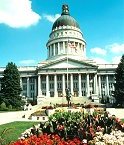The rebuilding of the Nauvoo Temple is a sign that countries can change, an expert on religious freedom says.
Michael K. Young, chairman of the U.S. Commission of International Religious Freedom and dean of George Washington University Law School, said the United State's record on religious freedom is not perfect.
Speaking at the Marriott University Park Hotel in Salt Lake City to a conference of the 2002 Center for Studies on New Religions, Young said the persecution that forced early members of The Church of Jesus Christ of Latter-day Saints to abandon the city of Nauvoo and the temple there in the 1840s is one example of religious intolerance.
"We are not blameless . . . but we, like other countries, are capable of change," he said, adding that this time around, during the reconstruction of the temple, there has been virtually no persecution.
During his speech, Young emphasized the importance of freedom of religion not because it is a right guaranteed in the First Amendment but because it is recognized by many organizations and policies, including the National Freedom Act of 1998, as an essential element for the fundamental dignity of an individual.
"Freedom of religion encourages equal treatment of any citizen and forces the state to recognize the individual. The state is there to serve the interest of the people. The people are not there to serve the interest of the state," Young said.
The most recognizable government offenders of human rights are Burma, China, Iran, Iraq, North Korea and Sudan, Young said. The governments of those countries limit or control the religions allowed to practice and assemble within their borders. They pass laws illegalizing membership in groups the government identifies as sects or cults, Young said.
Instead of passing laws against involvement with such groups, Young said those governments should prosecute the members of those groups when they break the existing laws.
But fear of terrorism in the post-Sept. 11 world has lead many governments to change policies, Young said. Anti-terrorism laws have been approved in many countries that limit the rights of individuals to congregate, he said.
Young strongly criticized France and Belgium for their attempt to define what an "acceptable religion" is or isn't.
"The best ideas are selected in the free exchange of ideas," Young said, adding, "Religion is not a surrogate for terrorism."
In authoritarian regimes like China, the government tries to control religion, allowing only a few "approved" churches while viewing members of smaller religions as part of separatist movements.
Under this style of government, Tibetan monks can be labeled terrorists, he said.
The conference will conclude today. Salt Lake City is the second host city in the United States and the 13th city in the world to host the conference since it began in 1988.

